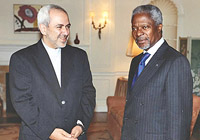Tonight: The View from Iran
U.N. ambassador answers questions via video

To President Bush, Iran is part of an “axis of evil.” To Iranian leaders, America is the “great satan.” Bilal Bilici (CAS’07), president of Boston University’s International Students Consortium (ISC), thinks such rhetoric is counterproductive and that open discussion is key to defusing international disputes.
So, last fall, as the debate over Iran’s nuclear ambitions was heating up, Bilici, an economics major originally from Turkey, e-mailed M. Javad Zarif, Iran’s ambassador to the United Nations, to ask if he’d be willing to have a dialogue with BU students. Zarif responded favorably within a day. The result, a live videoconference with the ambassador, will be held tonight, February 1, from 6 to 8 p.m. in the George Sherman Union’s Metcalf Hall. Admission is free.
Zarif, University Provost David Campbell, and Charles Dunbar, a College of Arts and Sciences professor of international relations and former U.S. ambassador to Qatar and Yemen, will make opening remarks. The heart of the conference will be a question-and-answer session with audience members and the ambassador, who will appear on-screen from a studio in New York. Two cameras in the auditorium will allow Zarif to see the audience and anyone who steps up to the microphone to ask a question. That session will be moderated by Dean of Students Kenneth Elmore.
Bilici and ISC’s advisor, Paul Greene, Metropolitan College assistant dean for international initiatives, expect there will be at least an hour for audience questions. There certainly are plenty of topics to discuss: Iran’s nuclear program, its Holocaust-denial conference, its support of Hezbollah, and its role in allegedly fomenting or potentially quelling violence in Iraq. “There could be some difficult moments,” says Greene.
Karim Zahran (CAS’08), who plans to attend, says that the forum could get emotional. “Iran is involved in many issues that a lot of people feel very sensitive about,” notes the economics major, a native of Egypt. Zahran is eager to see how a high-level diplomat from Iran addresses these controversial and prominent issues. “It will be like an advanced international relations class in action,” he says.
The organizers of the event are well aware that criticism is likely to emerge. “The event is extremely controversial because of the outlandish and dreadful actions and words of the current Iranian president [Mahmoud Ahmadinejad] concerning the denial of the Holocaust and the indication that Israel should be wiped off the map,” Dunbar explains. “At the same time, I think the United States has an interest in talking to everyone in the Middle East, whether they are our friends or our foes.”
In September, a furor ensued when Harvard invited Iran’s former president Mohammad Khatami to speak at the Kennedy School of Government. Governor Mitt Romney refused to allow the usual state police protection afforded visiting diplomats.
“We do expect that there will be controversy surrounding this event,” says Greene, but he notes that senior BU administrators and most faculty members he’s heard from have been supportive. “They see this as an incredibly important event,” he says. “The opportunity to hear the other side and also make our views known is an important part of who we are as a culture and a society.”
Bilici says that his group had invited Democratic presidential candidate Dennis Kucinich as an American counterpart to Zarif, but the Ohio congressman couldn’t attend because of a scheduling conflict.
“We wanted to create dialogue, because our organization’s purpose is to do humanitarian, intellectual, and cultural programs,” says Bilici. Other recent ISC events include a forum with four Central Asian ambassadors in November and an interfaith dinner in October marking Ramadan, Yom Kippur, and the birthday of Mohandas Gandhi. “There should always be dialogue, because if there is dialogue, that shows that there is goodwill and that you respect the other side,” he says. “It’s very important to both create understandings and eliminate misunderstandings.”
Chris Berdik can be reached at cberdik@bu.edu.